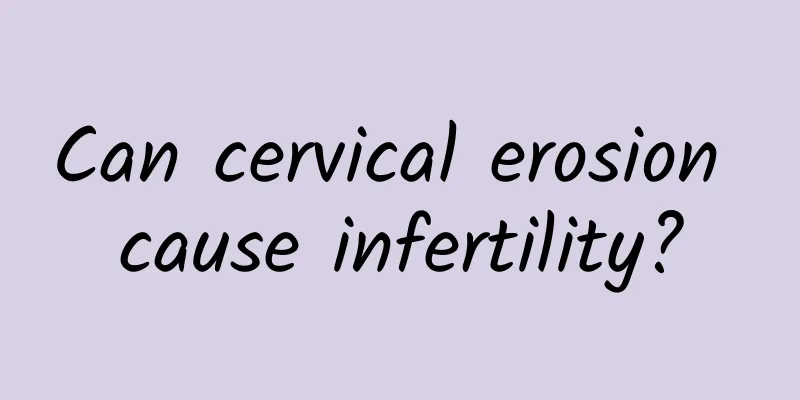Can cervical erosion cause infertility?

|
Cervical erosion may lead to infertility, but this consequence does not occur in all cases. Its impact is mainly related to the extent of the disease, whether it is accompanied by infection, and whether it is treated in time. To prevent infertility, it is necessary to accurately identify the cause and take targeted treatment measures, including medication, physical therapy, and surgical intervention. 1) Causes of cervical erosion and risk of infertility Cervical erosion is a state of columnar metaplasia of the cervical epithelium, which is a physiological phenomenon in itself. However, if it is accompanied by persistent inflammatory infection, such as chronic cervicitis, cervical stenosis, adhesion and other pathological problems, it may lead to abnormal cervical mucus environment, obstruction of sperm entering the uterus, and ultimately affect the combination of sperm and egg. If cervical erosion is not treated in time, the inflammation may spread upward to the endometrium or pelvic cavity, causing serious problems such as endometritis or salpingitis, which are direct threats to female fertility. Regular gynecological examinations are extremely important for women. 2) How to treat cervical erosion to avoid infertility -Drug treatment: Mild cervical erosion can usually be treated with local medications, such as antibiotic ointments, estrogen drugs, etc. to relieve local inflammation, help restore the normal cervical mucosal environment, and rarely affect fertility. -Physical therapy: For patients with moderate and some severe erosions, doctors may recommend physical therapy, such as cryotherapy, high-frequency radiofrequency surgery (LEEP knife) or laser treatment. These technologies can accurately remove damaged tissue and restore cervical function, but close follow-up is required after surgery to ensure the safety of pregnancy preparation. -Surgical treatment: For severe cases with the risk of cancer, cone biopsy or other surgeries may be required. Cone biopsy may shorten the cervix, and you need to fully communicate with your doctor before the operation to assess the potential impact on fertility. 3) The importance of daily care In addition to treatment, it is also important to maintain a healthy lifestyle. Avoiding staying up late, quitting smoking and limiting alcohol consumption, paying attention to private hygiene, and regular follow-up visits can all help maintain a stable cervical environment. It is best to have a full-body checkup before pregnancy to ensure that there are no hidden dangers. Cervical erosion may indeed lead to infertility, but through active prevention and standardized treatment, most patients can still prepare for pregnancy and give birth normally. If you have similar symptoms, it is recommended to see a doctor as soon as possible and get professional guidance. |
<<: What to do if folic acid causes amenorrhea
>>: Can vaginal ultrasound detect pregnancy?
Recommend
Do you know the cause of ovarian cysts?
Do you know what the cause of ovarian cysts is? W...
What are the symptoms of pelvic peritonitis
Nowadays, many women in society are busy and do n...
1 in 4 people suffer from fatty liver, here are 5 tips to protect your liver! Nutritionist: 4 tips to stay away from fatty liver
People often hear that "if your liver is hea...
How to treat uterine fibroids and ovarian cysts
The treatment of uterine fibroids and ovarian cys...
The price of tea eggs in convenience stores has increased! Understand calories, protein, and cholesterol at once!
The price of tea eggs in convenience stores is go...
What are the consequences of untreated Bartholinitis?
What are the consequences of long-term untreated ...
People should take good care of the prevention of cervicitis in their lives
Nowadays, cervicitis can occur at any time in lif...
What to eat for abnormal vaginal discharge? 8 delicious soups to try
Normal vaginal discharge is good for health becau...
How to diagnose acute pelvic inflammatory disease or chronic pelvic inflammatory disease
How to diagnose acute pelvic inflammatory disease...
How much does it cost to treat uterine fibroids? Common symptoms of uterine fibroids
First of all, you should know that there are many...
What medicine should I take to treat uterine fibroids and blood heat? How to treat uterine fibroids and blood deficiency?
What medicine should I take to treat uterine fibr...
Is uterine fibroid a tumor? Doctors explain uterine fibroids from 3 aspects
Uterine fibroids are benign tumors caused by abno...
What foods should I eat if I have abnormal leucorrhea?
Abnormal leucorrhea can be improved with the help...
The calories of the commercially available spring rolls are high, with 500 calories per roll
The Qingming Festival is approaching, and people ...
Is adnexitis the same as pelvic inflammatory disease?
In life, many female friends have very vague defi...









